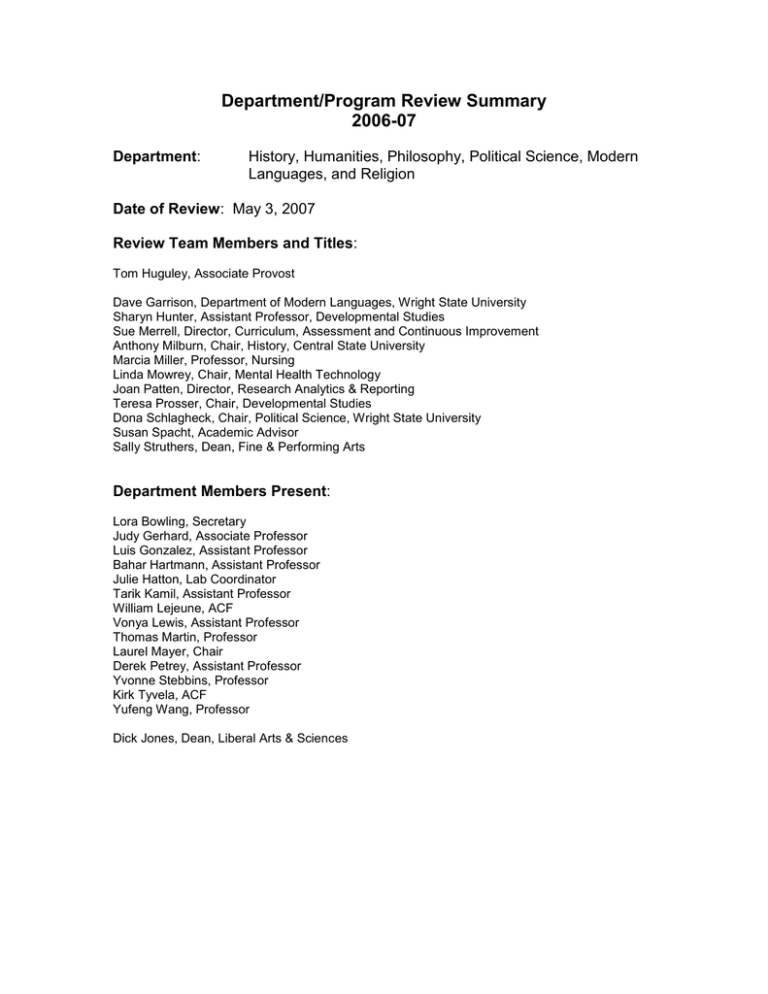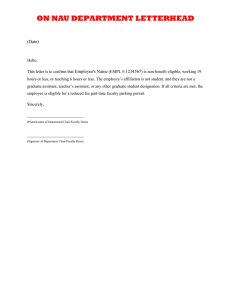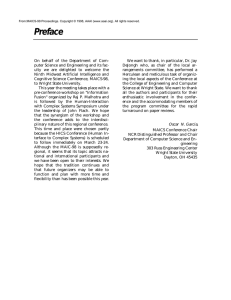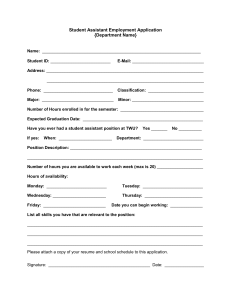Department/Program Review Summary 2006-07 History, Humanities, Philosophy, Political Science, Modern
advertisement

Department/Program Review Summary 2006-07 Department: History, Humanities, Philosophy, Political Science, Modern Languages, and Religion Date of Review: May 3, 2007 Review Team Members and Titles: Tom Huguley, Associate Provost Dave Garrison, Department of Modern Languages, Wright State University Sharyn Hunter, Assistant Professor, Developmental Studies Sue Merrell, Director, Curriculum, Assessment and Continuous Improvement Anthony Milburn, Chair, History, Central State University Marcia Miller, Professor, Nursing Linda Mowrey, Chair, Mental Health Technology Joan Patten, Director, Research Analytics & Reporting Teresa Prosser, Chair, Developmental Studies Dona Schlagheck, Chair, Political Science, Wright State University Susan Spacht, Academic Advisor Sally Struthers, Dean, Fine & Performing Arts Department Members Present: Lora Bowling, Secretary Judy Gerhard, Associate Professor Luis Gonzalez, Assistant Professor Bahar Hartmann, Assistant Professor Julie Hatton, Lab Coordinator Tarik Kamil, Assistant Professor William Lejeune, ACF Vonya Lewis, Assistant Professor Thomas Martin, Professor Laurel Mayer, Chair Derek Petrey, Assistant Professor Yvonne Stebbins, Professor Kirk Tyvela, ACF Yufeng Wang, Professor Dick Jones, Dean, Liberal Arts & Sciences Commendations: The department is commended on its high degree of collegiality and the successful collaborations among the major discipline areas of humanities, government, and modern languages. The faculty and staff have capitalized on the potential for synergy associated with the diversity within the department. The department-wide chat room established in January on my.sinclair served as an excellent vehicle to encourage department interaction and the inclusion of all employees (full and part time) in the self study process. The department has responded well to the growing demand for education in languages. Noteworthy are the offerings for law enforcement, allied health, and city employees, as well as courses in Farsi and Chinese. Members in the department are making good use of technology to support learning, evidenced in part by the resources of the Modern Languages Lab and the development of thirteen web courses. The faculty encourage students’ participation through clubs and special programs, such as conversational tables in four languages. The department strongly supports the honors program and two of its faculty members currently serve as advisors for the Nu Pi Chapter of Phi Theta Kappa. The department has been an active participant in state TAG panels, resulting is six basic history courses and five basic political science courses being approved for TAG transfer. Recommendations for Action: While learning outcomes may be clearly stated in some areas and there is good evidence of enrollment growth, there is little direct evidence to support student accomplishment of learning outcomes or improvements made in programs and courses as a result of this evidence. The department needs a focused effort on assessment with attention to direct use of data for program and course improvements. Consider a course coordinator/tool set model for high enrollment courses to ensure common learning outcomes for students across sections. Structures and/or processes to support consistency are especially valuable in a department with such a variety of offerings. The pre and post assessment tool for philosophy courses appears to offer promise for improving assessment. This tool should be tested, revised, implemented and shared with other programs in the department as one example of assessment to expand and improve learning outcomes. Develop and implement more extensive orientation, support and supervision for part time faculty. Examine best practices in other departments across the college for successfully including part-time faculty in the department. Develop and implement a standardized departmental tool for student evaluation of all instruction in the department. The results of this tool will provide one important source of information for future assessment. Consider developing a peer evaluation process which builds on the collegiality of the faculty and improves the teaching of instructors and the learning of students. Consider creative ways to address how to respond to increasing student demand and manage costs. Are there practices or offerings that can be changed or abandoned? Increase articulations with Wright State University, the University of Cincinnati, and other colleges in the area. Work more closely with the divisional representative on the Curriculum Review Committee and learning liaison to ensure course offerings in the department are meeting student needs for certificate and degree programs in other departments. Overall Assessment of Department’s Progress and Goals: The department has a good record of growth in enrollments which needs to be coupled with an assessment program which uses data to document student success. The department has highly motivated faculty with strong academic credentials who are clearly student centered and committed to meeting community needs. The department also demonstrates a strong record of community linkages with a variety of organizations such as local universities, City of Dayton, Latino Connections, and the Miami Valley Child Development Center. Particularly noteworthy is the department’s willingness to receive students at various levels of preparedness without adding prerequisites to introductory courses. This large and diverse department has a unique opportunity to build on its reputation for collegiality and community outreach by establishing a strong program of assessment directly linked to student outcomes. Institutional or Resource Barriers to the Department’s Ability to Accomplish its Goals, if any: Faculty in the college may request assignment to podium classrooms but not use the technology provided in these rooms. As the college moves to employ a greater proportion of part-time faculty, increased attention to the recruitment and support of these faculty will be needed. Faculty may need additional training and experience with data-driven assessment of student learning.


